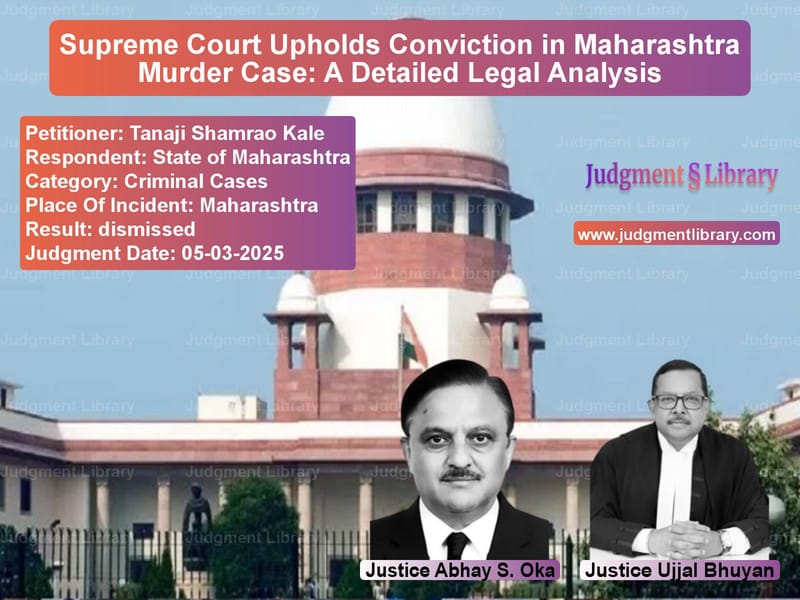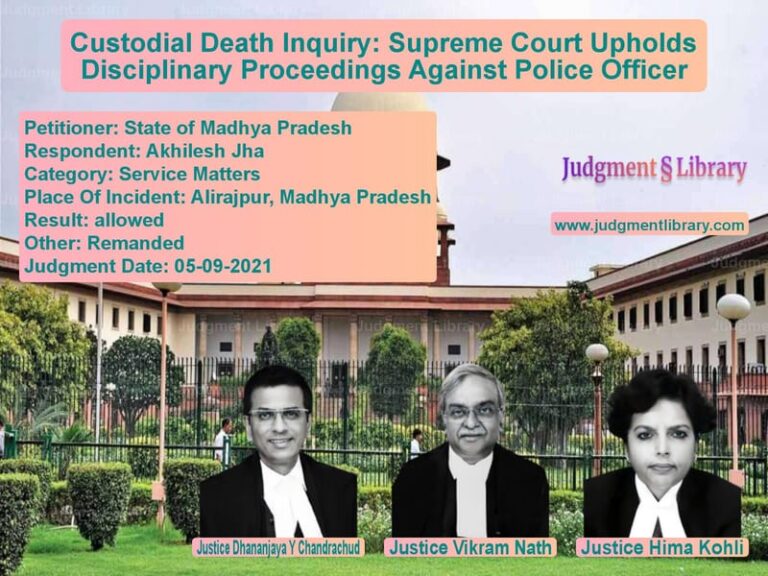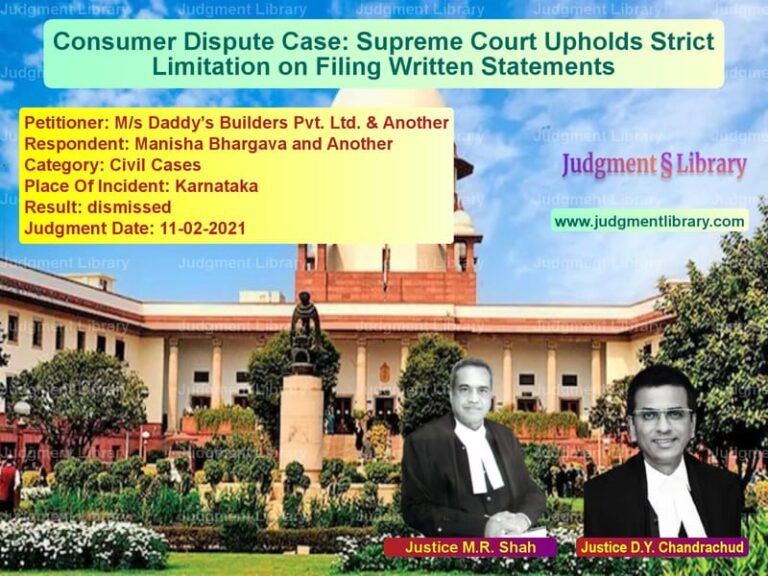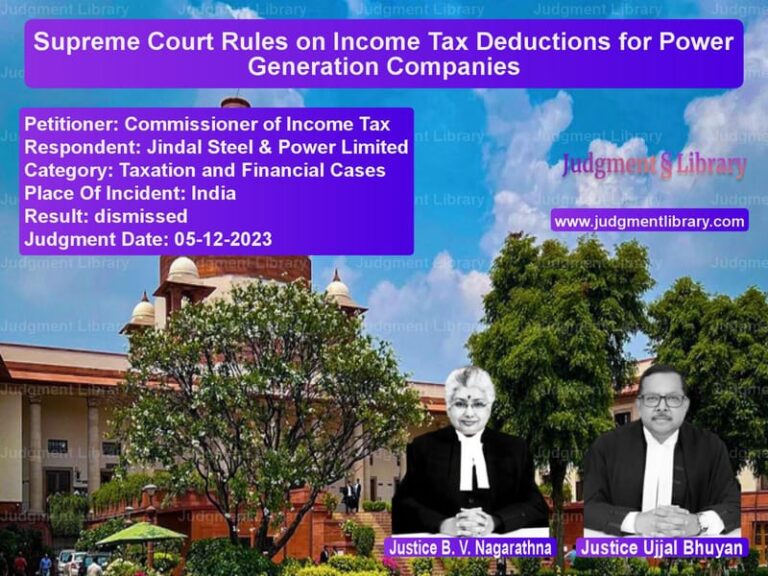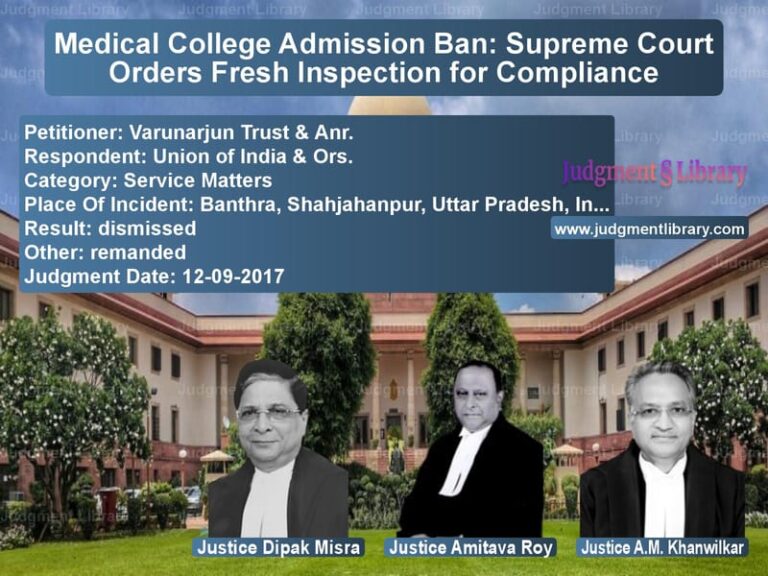Supreme Court Upholds Conviction in Maharashtra Murder Case: A Detailed Legal Analysis
The Supreme Court of India recently delivered a landmark judgment in the case of Tanaji Shamrao Kale v. State of Maharashtra, upholding the conviction of the accused in a brutal murder case. The appellants, including Tanaji Shamrao Kale and others, were charged under Sections 148 and 302 read with Section 149 of the Indian Penal Code (IPC) and sentenced to life imprisonment. The case involved the violent killing of a man over a long-standing property and irrigation dispute.
Background of the Case
The case arose from a dispute over land and irrigation in a village in Maharashtra. The deceased, Murlidhar, was attacked by a group of assailants armed with swords and sticks. The attack was allegedly carried out by nine accused individuals, out of whom one was acquitted by the trial court. The rest, including Tanaji Shamrao Kale, were convicted.
Key Facts
- The incident occurred on July 18, 2001, between 10:15 AM and 10:30 AM.
- The deceased was assaulted with swords, resulting in fatal injuries.
- Eyewitnesses included the deceased’s nephew (PW-1), his mother (PW-5), and a bystander (PW-2).
- The accused were convicted by the trial court, and the conviction was upheld by the High Court.
- The Supreme Court rejected the appeals of the accused and confirmed the life sentences.
Arguments by the Parties
Appellants’ (Accused’s) Arguments
- The defense argued that the prosecution’s witnesses were unreliable and had inconsistencies in their statements.
- The accused Tanaji Shamrao Kale claimed an alibi, asserting that he was on official duty with the police at the time of the incident.
- The appellants highlighted that some key eyewitnesses mentioned in the FIR were not examined during the trial.
- The appellants contended that the prosecution failed to prove a common intention to commit murder.
Respondent’s (State’s) Arguments
- The prosecution relied on the testimony of three key eyewitnesses, all of whom provided a consistent account of the crime.
- The injuries on the deceased matched the description of the attack given by the eyewitnesses.
- The alleged alibi of Tanaji Shamrao Kale was unconvincing, as he could not prove that he was elsewhere at the time of the incident.
- The prosecution argued that the presence of multiple assailants and the use of weapons established a case under Section 149 IPC (unlawful assembly with common object).
Supreme Court’s Analysis and Judgment
Credibility of Eyewitnesses
The Court meticulously examined the testimonies of three crucial eyewitnesses: PW-1 (nephew of the deceased), PW-2 (a bystander), and PW-5 (mother of PW-1). The Court held:
“The version of PW-1 about the incident reads thus: ‘The incident took place on 18.07.2001 at about 10.15 a.m. to 10.30 a.m. At that time, I was taking meals in my house. I heard big shouts of my mother. I came running from my house. My mother was shouting loudly and uttering that Ratu Kale, Satu Kale, and others were beating my uncle. I proceeded towards the spot where the said persons were beating my uncle. I saw them giving blows of swords on his shoulders, wrists, and knees.’”
The Court noted that there were no material contradictions in the witnesses’ statements, making their testimonies reliable.
Rejection of Alibi Defense
The defense had presented an alibi for Tanaji Shamrao Kale, stating that he was assigned official duty as a police constable. However, the Court ruled:
“The accused has not adduced any independent evidence to prove that he was elsewhere at the time of the incident. The evidence from his duty records merely states that he was assigned to a task, but there is no proof that he was present at a different location during the crime.”
Thus, the Court dismissed the alibi claim.
Presence of Unlawful Assembly
The Court analyzed whether the accused shared a common intention to commit the crime. It held:
“The accused were present at the scene, armed with swords and sticks, and assaulted the deceased in a coordinated manner. This satisfies the requirements of unlawful assembly under Section 149 IPC.”
Final Verdict
After considering all the evidence, the Supreme Court dismissed the appeals, stating:
“There is no merit in the appeals. The appeals are dismissed. We direct the accused no. 9-Tanaji Shamrao Kale to surrender within one month from today to undergo the remaining sentence.”
Key Takeaways from the Judgment
- The Court reaffirmed the importance of eyewitness testimony in murder trials.
- It clarified that an alibi defense must be backed by strong, independent evidence.
- It reinforced the principle that common intention can be inferred from coordinated actions.
- The judgment set a precedent for handling cases under Section 149 IPC.
Conclusion
The Supreme Court’s judgment in this case upholds the integrity of criminal investigations and trials. By emphasizing the reliability of eyewitness testimonies and rejecting unsubstantiated defenses, the Court reinforced the legal principles governing murder cases and unlawful assembly. This ruling serves as a crucial reference for future cases involving group violence and shared criminal intent.
Petitioner Name: Tanaji Shamrao Kale.Respondent Name: State of Maharashtra.Judgment By: Justice Abhay S. Oka, Justice Ujjal Bhuyan.Place Of Incident: Maharashtra.Judgment Date: 05-03-2025.
Don’t miss out on the full details! Download the complete judgment in PDF format below and gain valuable insights instantly!
Download Judgment: tanaji-shamrao-kale-vs-state-of-maharashtra-supreme-court-of-india-judgment-dated-05-03-2025.pdf
Directly Download Judgment: Directly download this Judgment
See all petitions in Murder Cases
See all petitions in Attempt to Murder Cases
See all petitions in Bail and Anticipatory Bail
See all petitions in Judgment by Abhay S. Oka
See all petitions in Judgment by Ujjal Bhuyan
See all petitions in dismissed
See all petitions in supreme court of India judgments March 2025
See all petitions in 2025 judgments
See all posts in Criminal Cases Category
See all allowed petitions in Criminal Cases Category
See all Dismissed petitions in Criminal Cases Category
See all partially allowed petitions in Criminal Cases Category

